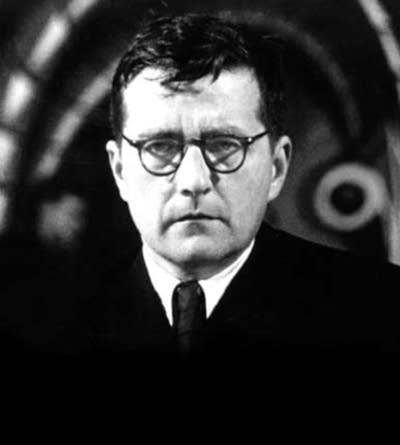Through many mirrors, dimly: 100 years of Shostakovich
Go Deeper.
Create an account or log in to save stories.
Like this?
Thanks for liking this story! We have added it to a list of your favorite stories.

A musical genius is dashed on political reefs.
What happens?
What compromises must be made? What guises must be adopted?
What does sadness mean? Or satire?
Turn Up Your Support
MPR News helps you turn down the noise and build shared understanding. Turn up your support for this public resource and keep trusted journalism accessible to all.
Is joy ever joy?
Dmitri Shostakovich lived his life negotiating these dangerous waters.
Our subject is a moving target. Choose your metaphor: The endless peeling away of masks--a mirror within a mirror, within a mirror.
All told, a human being, and any meditation on Dmitri Shostakovich may amount to an exercise in living with ambiguity.
Dmitri Shostakovich was born in St. Petersburg, on September 25, 1906. His mother Sofia was a good pianist. She accompanied her husband, an engineer with a decent tenor voice, in romances and gypsy songs.
The Shostakovich family was what was known as "narodniki," radical democrats in tsarist days who supported the idea and ideals of the 1917 October Revolution. Dmitri's grandfather had been sent to Siberia in a round-up of intellectuals after an assassination attempt against Tsar Alexander II in 1866.
Shostakovich's gift didn't appear early. He wasn't particularly interested in music. Later he said it was a fear of the look of musical notation. That and the fact that his mother's piano lessons tended to reduce his sisters to tears. But when he began to play, it was something unusual. At 13 he entered the Petrograd Conservatory.
Maximilian Steinberg and Alexander Glazunov were his teachers. Both were traditionalists, and gave Shostakovich a thorough grounding in harmony. Even as he went his own way and wrote music that shocked or baffled them, the respect and the love remained. Instead of chafing against restraints, Shostakovich simply ignored them.
Later there would be consequences for this. His first symphony, premiered when he was 19, made him a young man to watch. For the rest of his life he celebrated the anniversary of the premiere, May 12, 1926.
A celebrity early on, he forgot old friends, or so they complained, and was drawn to the glitterati of the day.
He neglected certain prescribed studies. At the conservatory he failed the political exam in Marxism. He laughed about it and later passed, but as a plot device it was an omen.
When he was 15 his father died and money was a constant concern for the family. He played piano for silent films--liked the films, hated the work, exhausted himself: prelude to a life of uncertain health.
In 1932 Shostakovich wrote an opera about a murderess. It was popular, but that she was a sympathetic character was something of an official scandal.
Then Joseph Stalin saw "Lady Macbeth of the Mtsensk District" on January 26, 1936. The specific scandal of the opera was just a pretext for doing something about the intellectuals, bringing them in line with the ideal of the Soviet New Man.
Just two days later an article appeared in Pravda: "Muddle Instead of Music," it was titled, damning Shostakovich with feigned praise: Such a talented young man. But, but such a pity, coming off the rails. Something must be done to correct him, for his own good.
It talked of bourgeois tendencies, formalism, self-indulgent experimentation: all inconvenient contradictions of the Soviet brand.
Just a week later, Shostakovich was reprimanded again, this time for a ballet called "The Limpid Stream." Practically overnight, Shostakovich went from bright star of Soviet music to depraved representative of cultural decadence.
He quickly shelved his fourth symphony, the apotheosis of experimentation and formalism, and wrote his Symphony No. 5.
The proper socialist composer wrote music that was accessible to all, based on the folk music of the people, was optimistic about the Soviet future and celebratory of the Soviet leadership.
Designed to mollify the cultural authorities, the Fifth Symphony was a triumph, almost too great a triumph. Officials grumbled that the 20-minute ovation at the premiere was planned.
Neverthess, a pattern was set.
Transgression. Reprimand. Rehabilitation. Redemption, contingent upon continued good behavior. It was a cycle that would repeat itself throughout Shostakovich's life.
At the same time he established a concurrent pattern, also endlessly repeated, of laying another set of expressions deeply between the lines.
This was of a different character altogether, and decidedly off-message, for the good Socialist Realist composer that Dmitri Shostakovich had at least to appear to be.



